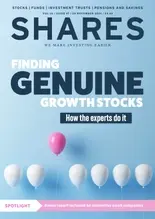
- Tobacco and alcohol firms lead UK rankings
- AI machine analyses more than 10,000 data points
- Produces probabilities, not certainties
Tobacco and alcohol producers feature among the best UK stocks to buy in July, according to Danelfin’s proprietary artificial intelligence stock picking engine. Imperial Brands (IMB) and Diageo (DGE), behind the Lambert & Butler, Rizla and Johnny Walker brands, stand first and second in the latest UK rankings, based on the likelihood of outperformance, according to Danelfin’s latest data.
Recruiter Hays (HAS), Primark-owner Associated British Foods (ABF) and Smiths (SMIN), the aerospace and defence engineer – pitched by Shares as a Great Idea in May 2023 – complete Danelfin’s UK top five, which each company scoring a nine out of 10.
HOW DANELFIN’S AI PICKS STOCKS
Danelfin has built a stock analytics platform powered by explainable artificial intelligence. It ranks stocks based on more than 10,000 daily indicators for each company, drawn from more than 900 fundamental, technical and sentiment indicators.
"Best" UK stocks for July: Scores out of 10
| Imperial Brands | 9 |
| Diageo | 9 |
| Hays | 9 |
| Associated British Foods | 9 |
| Smiths Group | 9 |
Source: Danelfin
This produces an easy-to-understand global AI score, ranging from 1 to 10; the higher the score, the higher the probability of beating the market over the next three months.
Danelfin claims that its ‘Best Stocks’ strategy handsomely beat the overall market over a six-year period. Its demonstration sample of US stocks generated a return of +158% between 3 January 2017 to 30 December 2022, versus a +70% return from the S&P 500.
‘PROBABILITIES, NOT CERTAINTIES’
It is important to understand that the stocks on the list are not guaranteed to make you money.
‘The AI score rates stocks according to the probability of beating the market in the short term (three months),’ says Danelfin. For US-listed stocks, the benchmark is the S&P 500 total return index, while the STOXX Europe 600 index is used for European equities.
Stocks with the highest AI scores (7 to 10) are seen as having a higher probability of outperforming the market, while stocks with the lowest AI scores (1 to 3) have a lower probability.
‘Our artificial intelligence calculates probabilities, not certainties,’ Danelfin says. ‘The AI scores and the ratings should be used as useful but not infallible information to complement your own investment decision process.’




